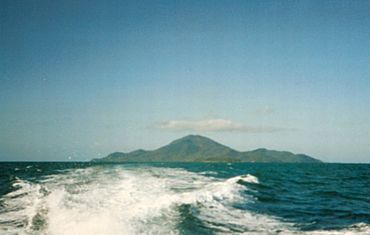Goold Island National Park facts for kids
Quick facts for kids Goold Island National ParkQueensland |
|
|---|---|
|
IUCN Category II (National Park)
|
|

Goold Island
|
|
| Area | 8.3 km2 (3.2 sq mi) |
| Managing authorities | Queensland Parks and Wildlife Service |
| Website | Goold Island National Park |
| See also | Protected areas of Queensland |
Goold Island is a beautiful national park in Queensland, Australia. It's about 1,250 kilometres (777 miles) northwest of Brisbane. This special island is near the top of Hinchinbrook Island. You can find it off the coast from Cardwell in Rockingham Bay. Goold Island is also part of the amazing Great Barrier Reef World Heritage Area.
The island covers about 8.3 square kilometres (3.2 square miles). It sits about 17 kilometres (11 miles) from the mainland shore. Most of Goold Island is covered with open eucalypt forests. It also has rainforest areas in its valleys and creeks with water that flows most of the time.
Goold Island's History
For thousands of years, the Bandjin people lived on Goold Island. They also used the nearby islands and seas. Generations of their ancestors enjoyed this area. They left behind many signs of their life. You can still find stone fish traps and shell middens (piles of shells from old meals) on the island today. These show how they lived and used the land.
The Bandjin people still value Goold Island very much. They see it as part of their "sea country." In December 2005, Goold Island became part of something special. It was included in Australia's and Queensland's first 'Traditional Use of Marine Resource Agreement'. This agreement helps the Bandjin people continue their traditional ways of using the sea and its resources.
Camping on Goold Island
If you want to camp on Goold Island, you need to plan ahead. Campers must bring their own water. You also need to bring all your camping gear. Camping is only allowed with a special permit. There are limited spots, so it's a good idea to book your spot early.
You can get to the island in a few ways. Some people take a ferry or a private boat. Others might use a charter boat or even a sea kayak. During the warmer months, be aware of marine stingers in the water. These are jellyfish that can sting, so it's important to be careful.
Nearby Islands: The Brooks
Close to Goold Island are the smaller Brook Islands. These include North, Tween, Middle, and South islands. The first three islands make up the Brook Islands National Park. These islands are very important for nesting birds. It's really important not to disturb the birds, especially when they are breeding.
Many different birds live here. You can see over 40,000 Torresian imperial-pigeons. Other birds include bridled terns, black-naped terns, roseate terns, and little terns. The beach stone-curlew also calls North Brook Island home.
 | William M. Jackson |
 | Juan E. Gilbert |
 | Neil deGrasse Tyson |


